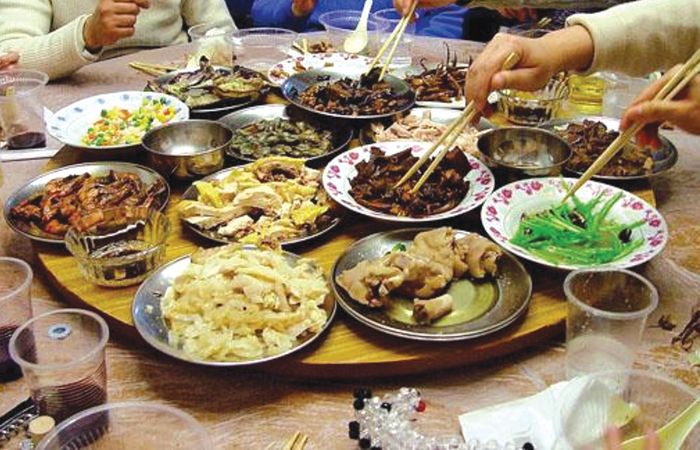Are You a Double-dipper?


By Mariam Mokhtar
You are at a party and your hosts are serving crudites and dips as well as crisps and hummus. Someone dips his carrot into the salsa and takes a bite of the vegetable, before he dips the rest of the vegetable, into the dip.


Imagine another scenario. You are seated for dinner with a group of people. You host sees that your plate is almost empty, and reaches over, chooses a piece of meat from the communal dishes in the centre of the table, and puts it onto your plate. He thinks he has done you a favour, but inside, you feel sick.
Others see that you could do with more food, so they use their own spoon to serve some fish, vegetables and other choice morsels onto your plate. Instead of feeling happy that your fellow diners are attentive to your needs, inwardly, you suppress the urge to throw up.
Although you know some of the guests, it does not excuse the fact that they broke etiquette. They should not have used their own spoons to put food on your plate.
This action is called double-dipping and some of you may think there is nothing wrong with this.
What would be your reaction if someone were to double-dip at dinner? Someone I know has no qualms about scolding the double-dipper. He insists that a serving spoon is used.
If the double-dipper persists, the person will throw the dish straight into the bin, to the consternation of his wife. He tells her that he would rather waste a bit of food, than allow others to be contaminated. He says that it is better to be safe, than contract a contagious disease.
You may think that the person who is double-dipping is just being cheeky, or has not seen the serving spoon.
The double-dipper may think there is nothing wrong in double-dipping, but there is scientific evidence to prove that this act is both harmful and dangerous.
The Sunday Times reported that the editor of the Harvard University’s Healthbeat journal, Dr Robert Shmerling, wrote about a study, in the Journal of Food Safety, which showed that the amount of bacteria in dips, increased if someone had double-dipped.
Even the process of dipping into a bag of popcorn with your saliva contaminated fingers will introduce and increase the amount of bacteria in the packet of popcorn. A paper in Food and Nutrition Sciences reported that saliva contained 1 million bacteria per millilitre.
So, do you double-dip? Do you use your own spoon to dish food onto a friend, or family member’s plate, instead of using a serving spoon?
Can germs from your mouth be transferred to the food on the dish? Or, from a crisp into a dip?
Does the person who double-dips lack table manners? Will he contaminate food that is to be shared at the table?
So what happens when you use your own spoon to transfer food to another person’s plate?
When you eat food from a spoon, some of your bacteria is transferred from your mouth to the spoon. When you use the same spoon to dish out more food, from the communal plate, the bacteria from your spoon, is transferred to the food. When someone else eats the food from that communal dish, he will ingest your bacteria, which was left behind on the food.
A health worker said “I frequently work with HIV/AIDS people, and I am careful that they do not double-dip when having communal food. It is not just HIV/AIDS you have be careful of, but there are other diseases like Hepatitis which are just as dangerous. People just do not think about the health implications.”
Another person said, “People may think they are clean, but who is to know? When seated at a table with strangers, or people I do not know too well, I would rather people observed proper etiquette.
“Would you like it if a doctor or dentist did not properly sterilise his equipment, and used it on you, after he had examined a HIV/AIDS person, someone with Hepatitis or someone with tuberculosis or even flu?
“I do not double-dip and I warn my guests at dinner, not to double-dip. People are very careless these days, but you could spread many diseases, from a simple act with a contaminated spoon.”
Double-dippers show arrogance and lack of consideration for others. Double-dipping is not a part of Malaysian culture. The Chinese have their gongkuai (serving chopsticks), the putongkuai (personal chopsticks) and their serving spoons. The Malays and Indians use serving spoons.
Food for thought for the double-dippers!


